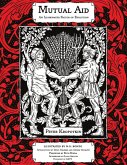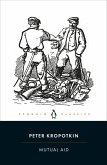"Make no mistake: the story that started with Pyotr Alexeyevich Kropotkin is far from finished. On the contrary, I believe there's a good chance that it's only just begun."-Rutger Bregman, Utopia for Realists and Humankind
"Russian social theorist Peter Kropotkin ... argued that voluntary cooperation has been key to the flourishing of human civilization."-The New York Times
"The book is undeniably readable throughout ... Those who disagree with [Kropotkin] may learn much by studying the book."-Nature
The fascinating work of a Russian prince-turned-anarchist, Peter Kropotkin (1842-1921). Kropotkin one of the world's first international celebrities. In England, Kropotkin was known as a brilliant scientist, famous for his work on animal and human cooperation, but Kropotkin's fame in continental Europe centered more on his role as a founder and vocal proponent of anarchism. In the United States, he pursued both passions. Tens of thousands of people followed ex-Prince Peter during two speaking tours in America.
Kropotkin's path to fame was unexpected and labyrinthine, with asides in prison, breathtaking 50,000-mile journeys through the wastelands of Siberia, and banishment, for one reason or another, from most respectable Western countries of the day. In his homeland of Russia, Peter went from being Czar Alexander II's favored teenage page, to a young man enamored with the theory of evolution, to a convicted felon, jail-breaker and general agitator, eventually being chased halfway around the world by the Russian Secret police for his radical - some might (and did) say enlightened - political views.
Both while in jail, and while on the run when he was entertaining and enlightening huge crowds, Kropotkin found the energy and concentration to write books on a dazzling array of topics: evolution and behavior, ethics, the geography of Asia, anarchism, socialism and communism, penal systems, the coming industrial revolution in the East, the French Revolution, and the state of Russian literature. Though seemingly disparate topics, a common thread - the scientific law of mutual aid, which guided the evolution of all life on earth - tied these works together. This law boils down to Kropotkin's deep-seated conviction that what we today would call altruism and cooperation - but what the Prince called mutual aid - was the driving evolutionary force behind all social life, be it in microbes, animals or humans. Today, anthropologists, political scientists, economists and psychologists publish hundreds of studies each year on human cooperation, and researchers in these fields are just beginning to realize that so many of the topics they are investigating were first suggested and promulgated by Peter Kropotkin.
"Russian social theorist Peter Kropotkin ... argued that voluntary cooperation has been key to the flourishing of human civilization."-The New York Times
"The book is undeniably readable throughout ... Those who disagree with [Kropotkin] may learn much by studying the book."-Nature
The fascinating work of a Russian prince-turned-anarchist, Peter Kropotkin (1842-1921). Kropotkin one of the world's first international celebrities. In England, Kropotkin was known as a brilliant scientist, famous for his work on animal and human cooperation, but Kropotkin's fame in continental Europe centered more on his role as a founder and vocal proponent of anarchism. In the United States, he pursued both passions. Tens of thousands of people followed ex-Prince Peter during two speaking tours in America.
Kropotkin's path to fame was unexpected and labyrinthine, with asides in prison, breathtaking 50,000-mile journeys through the wastelands of Siberia, and banishment, for one reason or another, from most respectable Western countries of the day. In his homeland of Russia, Peter went from being Czar Alexander II's favored teenage page, to a young man enamored with the theory of evolution, to a convicted felon, jail-breaker and general agitator, eventually being chased halfway around the world by the Russian Secret police for his radical - some might (and did) say enlightened - political views.
Both while in jail, and while on the run when he was entertaining and enlightening huge crowds, Kropotkin found the energy and concentration to write books on a dazzling array of topics: evolution and behavior, ethics, the geography of Asia, anarchism, socialism and communism, penal systems, the coming industrial revolution in the East, the French Revolution, and the state of Russian literature. Though seemingly disparate topics, a common thread - the scientific law of mutual aid, which guided the evolution of all life on earth - tied these works together. This law boils down to Kropotkin's deep-seated conviction that what we today would call altruism and cooperation - but what the Prince called mutual aid - was the driving evolutionary force behind all social life, be it in microbes, animals or humans. Today, anthropologists, political scientists, economists and psychologists publish hundreds of studies each year on human cooperation, and researchers in these fields are just beginning to realize that so many of the topics they are investigating were first suggested and promulgated by Peter Kropotkin.
Dieser Download kann aus rechtlichen Gründen nur mit Rechnungsadresse in A, D ausgeliefert werden.









